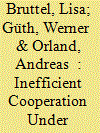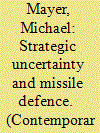| Srl | Item |
| 1 |
ID:
186326


|
|
|
|
|
| Summary/Abstract |
Stochastic uncertainty can cause coordination problems that may hinder mutually beneficial cooperation. We propose a mechanism of ex-post voluntary transfers designed to circumvent these coordination problems and ask whether it can increase efficiency. To test this transfer mechanism, we implement a controlled laboratory experiment based on a repeated Ultimatum Game with a stochastic endowment. Contrary to our hypothesis, we find that allowing voluntary transfers does not lead to an efficiency increase. We suggest and analyze two major reasons for this failure: first, stochastic uncertainty forces proposers intending to cooperate to accept high strategic uncertainty, which many proposers avoid; second, many responders behave only incompletely conditionally cooperatively, which hinders cooperation in future periods.
|
|
|
|
|
|
|
|
|
|
|
|
|
|
|
|
| 2 |
ID:
142975


|
|
|
|
|
| Summary/Abstract |
Strategic uncertainty remains a significant challenge for defence planners and national leaders responsible for developing and acquiring future military capabilities. Concerns in the United States over missile proliferation during the 1990s were embodied in the 1999 National Intelligence Estimate (NIE), which predicted the emergence of a long-range ballistic missile threat by 2015. Comparing the NIEs predictions with the actual evolution of the threat reveals not only an overly pessimistic evaluation but also politicization of the intelligence assessment. At the time of its release, the report added to a growing sense of vulnerability and further encouraged policy-makers to make suboptimal missile defence acquisition decisions. In particular, the worst-case scenario thinking exemplified by the 1999 NIE contributed to an unnecessarily rushed testing programme, the premature deployment of homeland missile defence and an oversized system in Europe. Although missile defence may have strategic value, the rush to deploy has resulted in a costly and less effective military capability due to unfounded fears of strategic surprise and entrenched notions of the ballistic missile threat. Strategic uncertainty will always be a challenge, but focusing solely on developing capabilities with less regard to the actual threat environment is a recipe for costly and ineffective weapons systems.
|
|
|
|
|
|
|
|
|
|
|
|
|
|
|
|
| 3 |
ID:
165101


|
|
|
|
|
| Summary/Abstract |
The United States has repeatedly intervened militarily in situations where tactical success on the battlefield did not translate into meaningful political resolution of the issues triggering the introduction of military force. Although US military interventions are hardly a recent phenomenon, a series of systemic, political and institutional developments over the past several decades have been particularly conducive to the limited use of force as a policy option. These factors have reduced the costs and risks of military intervention, incentivising the use of force in situations when it may not be the optimal policy response.
|
|
|
|
|
|
|
|
|
|
|
|
|
|
|
|